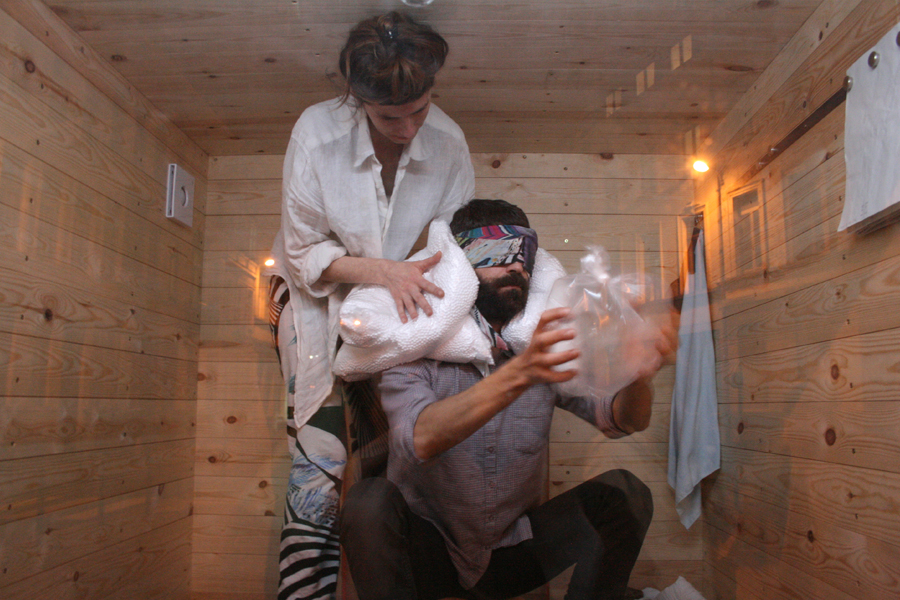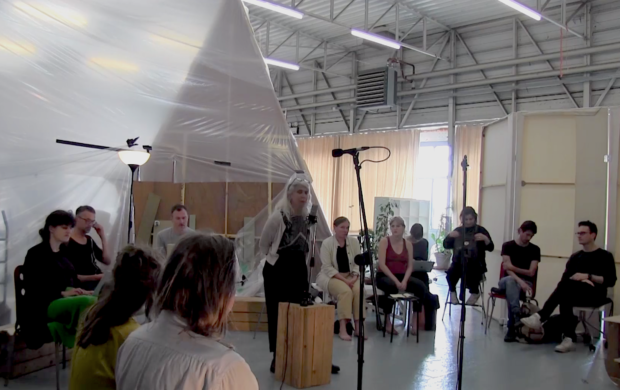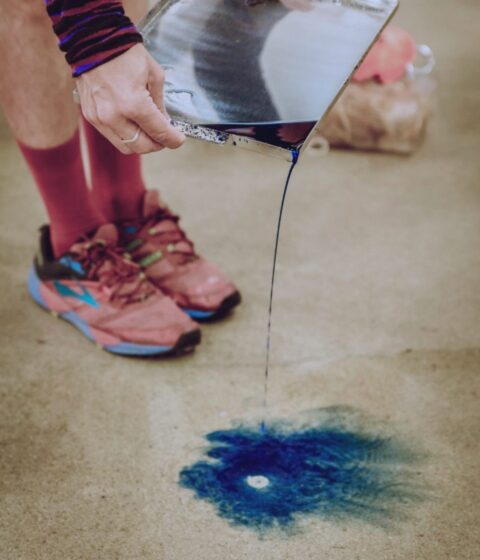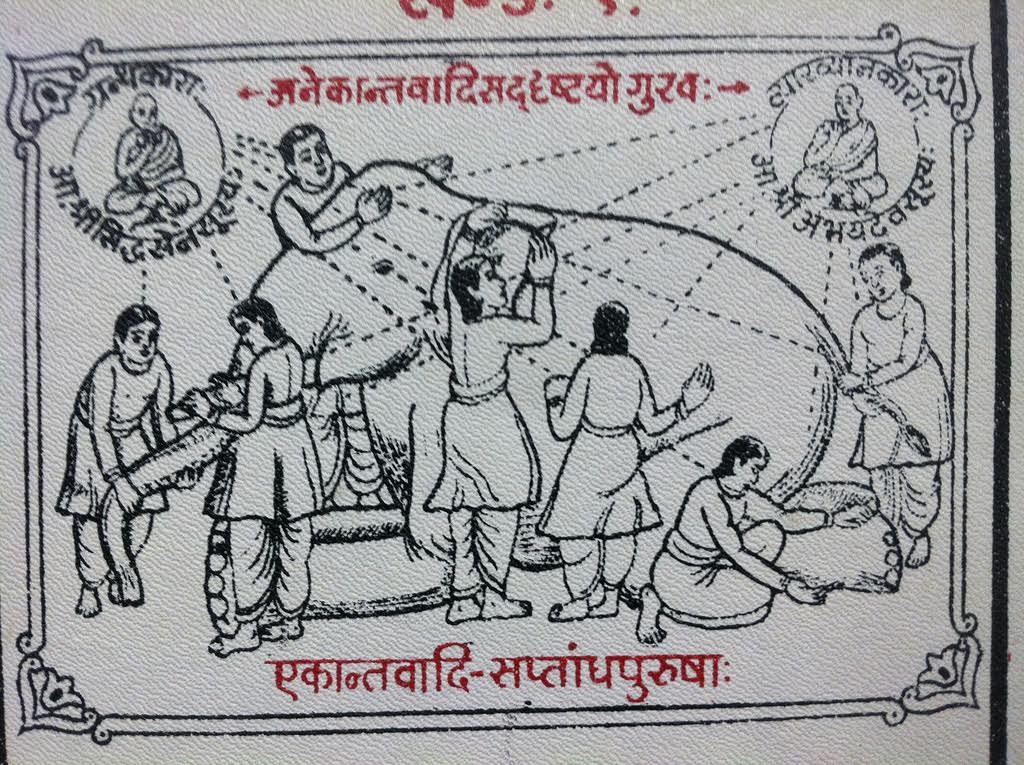research center
Artistic Research & a.pass : a critical practice
by Elke Van Campenhout (2015)
1. Questioning artistic research
To clarify what kind of research a.pass sustains, a minimum of conceptual transparency is needed. When we combine the terms ‘research’ and ‘artistic’, most of the time we are dealing with a research ON the arts (art history, musicology, theatre sciences, aspects of cultural sociology, aesthetics etc…) or a research IN the arts (a research that is part of a (regular) artistic practice). What we in a.pass consider as artistic research – a term that is often understood in reference to the Anglo-Saxon models for practice-based research – often is the result of a research in the arts, but cannot be reduced to it. A.pass doesn’t want to limit its range of research to the ‘artist research’ full stop: the necessarily research-oriented attitude that accompanies any kind of serious artistic endeavour, which does not necessarily have any link to the communication and valorization of research results as it is demanded in an academic context. ‘Research’, as it is understood in the artistic practice, is an evident part of this practice which allows for a result-oriented reflection on the work, or in other words: a research oriented towards the production of the art work as a product, as a repertory and/or as an oeuvre. In the a.pass environment, and in a playful questioning of the ‘academic’ research mind-set, this individual artist is not the sole focus of attention, or at least not in the sense that we perceive our researchers as artists tout court. An artist research has an inherent logic and validity, but does not necessarily have a need to be communicative to an outside community in any other form than through the production of art works. A.pass reflects on a research in the arts that is more than a report – in the art work itself or in the accompanying dissertation – of the individual research of an artist. What we consider an artistic research project is rather: ‘a new practice in the arts, which differs from the individual artist practice, as well as from the art historical or scientific research practice. One researches not only the art through the art works, but the functioning of art and the breadth of the art practice by way of interdisciplinary interventions in the (semi-)public, societal domain. Artistic research is an interdisciplinary concentration around a ‘binding’ problem that catches the attention of a pluriform group of participants.’ (Jouke Kleerebeezem, De Witte Raaf) This means that a question in the research of a.pass is always situated in a broader context than that of the sole artist: a lot of the questions that are posed in a.pass generate collective discussions and critique, find their way (partly) into other researches or attempt temporary coalitions in the defining and/or broadening up of a certain problematics. Important in this environment is the shared reflection concerning ways of working, diverse understandings of artistic research, the development of (post-disciplinary) perspectives and the experimentation with methodologies and strategies. The work of the artistic researcher does not coincide with the work of the artist in the sense that it is self-conscious, and explicitly communicates and circulates this self-reflection within a wider group of stakeholders. In other words, the emphasis in this kind of research is not so much on the conception and production of an art work – although this undeniably and unavoidably is part of the whole of the research – but rather on a questioning that puts the individual art practice and even the recognizable mono-discipline in a wider perspective. This kind of research originates from and builds on the demands and problematics of a shared debate, and can be approached by different specialist researchers, each addressing the question out of his own domain. The length, the quality criteria, the form, the communication strategies and the required ‘relevance’ of the research – and thus also the understanding of the requirements of the PhD -project that might eventually result out from it- are thus in principle dependent on the context and have to be negotiated on a project base between the researcher and the institution(s) involved. It is in this case very important to recognize a wider ‘public’, the potential users of this research, as a partner in this trajectory, and to develop the appropriate communication channels to make this participation possible.
2. Constructing a general intellect
Other than the ‘artist’s research’, artistic research overwrites the isolation and the hermetics of art production in the classical sense, in addressing in one way or another a socially relevant problematics. This kind of artistic research opens up new ways for the creation of a ‘generous cultural memory’. But at the same time the societal relevance of this research cannot coincide with its utilitarian value, since the direct impact of the research practice and reflection necessarily develops through artistic, affective gestures of experimentation and communication that resonate with, but never answer to, the concrete questions posed within the societal fabric. This kind of research thus will only influence the daily social, political, economic or scientific reality by a detour, through the unsettling of its self-reflection and imagination(s). This independent position, free from any preconditioned political preconceptions, economic value or socially determined relevance is a necessary and undeniable characteristic of this research practice. More than a pragmatic laboratory for the production of answers on societal questions, the research platform that is a.pass offers the possibility to construct a ‘general intellect’: a way of working wherein researchers collectively give form to diverse practices to produce and articulate knowledge in an open, shared research environment.
3. Investigating divergent forms of knowledge
In a.pass the relevance of the research is measured by the degree in which researchers, out of their different backgrounds and knowledge horizons, manage to formulate innovative perspectives on potential knowledge production, as well as on the development of tools to share and experiment this knowledge on the public scene. It is clear that the development of this kind of research environment also resonates with other institutions for art education on an (inter)national scale. Artistic research in a.pass can be seen as a third way, wedged in between the artistic practice as such and the more academic understanding of knowledge production. Different from the artistic practice the research is not limited to the individual trajectory, the personal questioning and aesthetics of the artist. But at the same time the art practice does take a central role in the development of new perspectives and methodologies, a way of working that relates to, but doesn’t coincide with, and even explicitly questions an academic AND an artistic framework. Artistic research in a.pass is not limited to the development of arts-practice-related knowledge, but also involves the creation and testing of formats, methodologies, communication strategies and shared practices, ‘tools for collaboration and communication’, that broaden up the understanding of artistic research from an art work with paper validation form to a more critical investigation into the statute, the circulation and the valuation of divergent forms of knowledge.
4. contextualising a singularity
The a.pass Post-master Program and Research Centre are positioned within a larger context of the arts and education, and develops its working out of a questioning of the current organization of artistic and educational (institutional) practices. In its trajectory, a.pass has on all levels of its organization critically reflected upon the economy of knowledge as it is being employed today in higher education and the media, the logics of the arts market, the recuperation of institutional critique by the institutions themselves, the capitalist drive for the new, the seductive and the quickly consumable, and the role and responsibility of the artist researcher in all of this.
In a.pass the relevance of the research is measured by the degree in which researchers, out of their different backgrounds and knowledge horizons, manage to formulate innovative perspectives on potential knowledge production, as well as on the development of tools to share and experiment this knowledge on the public scene. It is clear that this kind of research environment also resonates with other institutions for art education on an (inter)national scale. Artistic research in a.pass can be seen as a third way, wedged in between the artistic practice as such and the more academic understanding of knowledge production. Different from the artistic practice the research is not limited to the individual trajectory, the personal questioning and aesthetics of the artist. But at the same time the artistic practice does take on a central role in the development of new perspectives and methodologies, a way of working that relates to, but doesn’t coincide with, and even explicitly questions an academic AND an artistic framework. Artistic research in a.pass is not limited to the development of arts-practice-related knowledge, but also involves the creation and testing of formats, methodologies, communication strategies and shared practices, ‘tools for collaboration and communication’, that broaden up the understanding of artistic research from an art work with paper validation form to a more critical investigation into the statute, the circulation and the valuation of divergent forms of knowledge.
This means that a.pass is an environment that reflects and practices knowledge and artistic strategies with the windows open to an outside reality. In that sense a.pass is not so much a preparation for the ‘professional life’, as it is a putting-into-question of what these professional sectors (both the artistic and educational organizations of institutes, values and work) are symptoms of. Throughout the years, a.pass has used its own institutional status – and the opportunities offered by being an artistic educational program embedded in a larger network of schools, art centres, research places, workspaces, etc… – to seriously reconsider its role, and the role of the artist researchers within the current ethical, political, economic and social context of knowledge production and sharing.
On the level of ethics this means that we consider both the institute as the institute’s participants to be part of a larger network of relations, that give them their value and meaning. In a.pass the relation between the ‘I’ of the researcher and the provisional construction of the ‘We’ of the research practice within the institute, is a recurring, and politically charged, topic. The institute here is considered as an experimental field to try out strategies for the now and the future within a larger society. A.pass gives a lot of attention to the transindividual character of practice and knowledge, and how the collective environment can be both a source of frustration and feedback, as of nourishment and challenge to the individual researcher’s trajectory. Also, a.pass in that sense always takes the ‘ethical’ concreteness, the situational reality of research seriously: artistic research is always already embedded in the relations that produce it, and these relations encompass elements of discourse, social and economic factors and spatial settings, as well as institutional givens, societal demands and resources at hand. Therefore an artistic research strategy or outcome is not transparently reproducible without changing in the process. The ethical (here understood as relational and situational) character of the research, makes it resistant to commodification on a larger scale. But this doesn’t mean that the research can not be communicated or shared, using strategies that differ from the promise of serial reproduction.
This interest in the transindividual character of learning and research, however, does not exclude a strong focus and interest in the development of the individual’s trajectories. Since the institute can not function without the invested interest and contributions to the common environment of the researchers, a.pass strives towards creating an environment in which the aesthetic and artistic idiosyncratic qualities of each practice can be challenged into being. A.pass considers the artist researcher not so much as an artist-producer of work, but as an artist-researcher, reflecting self-critically on the trajectory already accomplished, and reconsidering the notions of work, value, the market, responsiveness and responsibility through the practicing of the research. A.pass encourages the exploration of ‘risky’ practices that do not directly correspond to the current demands of the arts market or academic understandings of research, in order to create an experimental environment in which certainties can be subverted, undermined, or simply reappraised from another point of view.



